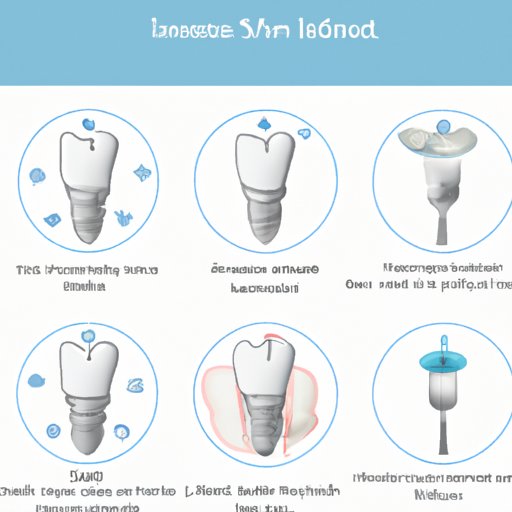Introduction
Dental implants are a common procedure used to replace missing teeth. The implant is inserted into the jawbone and acts as an artificial root to support a crown or bridge. After a successful implant surgery, a period of recovery is necessary before you can return to your normal diet. One of the most important aspects of recovery is eating the right foods. In this article, we’ll explore how long to eat soft foods after a dental implant and what to expect during the recovery period.
A Guide to Eating Soft Foods After a Dental Implant
Soft foods are an important part of the recovery process after a dental implant. They are easier to chew and require less energy to digest. This allows the body to focus its energy on healing the implant site. Soft foods also put less strain on the jaw muscles, which can be sore and tender after surgery.
What Are Soft Foods?
Soft foods are foods that are easy to chew and swallow without putting too much strain on the jaw. Examples of soft foods include cooked vegetables, mashed potatoes, scrambled eggs, oatmeal, applesauce, yogurt, soups, and pudding. Soft proteins such as fish, chicken, and tofu are also good choices. You should avoid hard, crunchy, or chewy foods such as nuts, chips, and raw vegetables.
Benefits of Eating Soft Foods After a Dental Implant
Eating soft foods has many benefits after a dental implant. It helps to reduce pain and discomfort in the implant area. Soft foods are also easier to digest and require less energy, allowing the body to focus its energy on healing. Additionally, soft foods are gentle on the jaw muscles, which can be sore and tender after surgery.
How Long Should You Wait to Eat Soft Foods After a Dental Implant?
Your dentist will provide specific instructions on when to start eating soft foods after a dental implant. Generally, it’s best to wait at least 24 hours after the implant is placed. This gives your body time to adjust to the new implant and begin the healing process. Your dentist may recommend waiting longer if there are any complications or additional procedures that need to be done.
It’s important to follow your dentist’s instructions closely. If you start eating hard or chewy foods too soon, it could cause damage to the implant or delay the healing process. Additionally, it’s important to listen to your body. If you experience any pain or discomfort while eating, stop and wait until the pain subsides before continuing.
Factors Affecting Recovery Time
The amount of time it takes to recover from a dental implant varies from person to person. Several factors can affect the recovery time, including:
- Age and overall health
- Type of implant
- Location of the implant
- Complications during surgery
- Post-surgery care

What to Expect When Eating Soft Foods After a Dental Implant
When eating soft foods after a dental implant, it’s important to expect some pain and discomfort. This is normal and should subside over time. You may also experience changes in taste due to the medication used during surgery. If you experience any excessive pain or discomfort, contact your dentist immediately.

A Timeline for Eating Soft Foods After a Dental Implant
The following is a general timeline for when to start eating soft foods after a dental implant:
Day 1-2:
It’s important to wait at least 24 hours after the implant is placed before eating anything. During this time, you can drink liquids such as water, broth, and juice. Avoid drinking through a straw as this can cause damage to the implant site.
Day 3-4:
At this point, you can start adding soft foods to your diet. Stick to foods that are easy to chew and swallow. Avoid hard or crunchy foods that could damage the implant.
Week 1-2:
By the end of the first week, you should be able to start introducing more solid foods into your diet. Avoid hard or crunchy foods and continue to eat soft foods as often as possible.

Tips for Eating Soft Foods After a Dental Implant
Here are some tips for eating soft foods after a dental implant:
- Choose healthy foods. Focus on lean proteins, fresh fruits and vegetables, and whole grains.
- Avoid hard or crunchy foods. These can damage the implant and delay healing.
- Consider taking a supplement. Some vitamins and minerals can help speed up the healing process.
Conclusion
Eating soft foods is an important part of the recovery process after a dental implant. It’s important to wait at least 24 hours after the implant is placed before eating anything. Your dentist may recommend waiting longer if there are any complications or additional procedures that need to be done. During the recovery period, it’s important to follow your dentist’s instructions and listen to your body. Choose healthy foods and avoid hard or crunchy foods to ensure a speedy recovery.
(Note: Is this article not meeting your expectations? Do you have knowledge or insights to share? Unlock new opportunities and expand your reach by joining our authors team. Click Registration to join us and share your expertise with our readers.)
